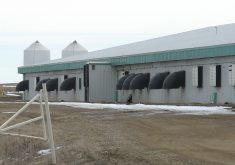Organic research and extension services are languishing in a province that is home to about one-third of Canada’s organic producers and half of its acreage.
Brenda Frick, former co-ordinator of organic research and extension at the University of Saskatchewan, said the industry has done a poor job pitching itself to Saskatchewan’s government.
There was a flurry of research in the early part of the decade but that has petered out. Frick believes the tide changed with the November 2007 election of the Saskatchewan Party.
Read Also

Phosphate prices to remain high
Phosphate prices are expected to remain elevated, according to Mosaic’s president.
She said the Saskatchewan Organic Directorate had developed a good rapport with the former NDP government but had spent little time building relationships with the opposition party.
“Perhaps the smarter thing would be to woo both sides of government rather than the ruling party at the time,” said Frick.
The environment and lifestyle case put forward to the NDP lacked traction with the Saskatchewan Party, she said.
“The perception of organic had kind of that sort of hippie flavour to it, whereas what we really need to make the case of to the current government is the business advantage of it,” she said.
The industry is advancing that case but it takes time. In the meantime, organic research and extension are suffering.
“I lost my funding at the end of June. It just ran out,” said Frick.
The governments of Saskatchewan and Alberta had been funding her position. Interim financing from Alberta will take her work at the U of S to the end of January. Frick remains hopeful Saskatchewan will provide long-term funding by then.
A few other university and federal government researchers are working on organics in the province but it takes up a small portion of their time, far less than it used to.
Frick is also concerned about extension work. A number of positions have been cut across the country and there seems to be a flagging commitment to long-term funding.
People involved in the occupation gathered in Banff, Alta., in August to discuss the state of organic extension.
“Essentially the state is reasonably lousy,” said Frick.
“There has been a real problem with long-term funding for the extension portion of organics.”
The group established a committee to devise a plan to fix the problem.
One of the reasons for waning government support for organic research and extension is that the industry has faltered of late.
“There were really high prices a couple of years ago and everything looked wonderful. That’s not where we are now,” said Frick.
“Organic sales have really declined, in part because of the American recession.”
There has also been fierce competition from the natural food sector.
But it’s not all doom and gloom.
Frick said there have been encouraging developments nationally. On Sept. 1, the federal government announced $6.5 million in funding for the Organic Agriculture Centre of Canada to establish Canada’s Organic Science Cluster.
The cluster incorporates 30 research projects involving more than 80 scientists at Agriculture Canada and at all of Canada’s leading agricultural universities. Industry partners are expected to contribute $2.2 million in matching funds to the project.
Frick said the money will go to projects that already had funding, so it may not improve the situation in Saskatchewan that much.















